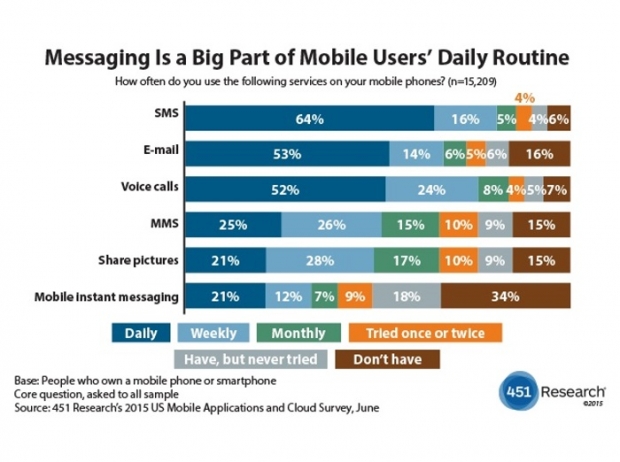
When Google acquired Jibe Mobile in October, the move was taken as a clear sign it was getting ready to lend its weight to push rich communications services (RCS) as a new messaging standard for Android devices. Now Google has joined wireless standards group GSMA and a host of global operators to launch an initiative to accelerate the adoption of RCS, according 451research.com. Operators including América Móvil, Bharti Airtel, Deutsche Telekom, Globe Telecom, Millicom, Orange, Sprint, Telenor Group, TeliaSonera, Telstra, Turkcell and Vodafone have agreed to transition to a single RCS standard, which will be supported by Android, according to a GSMA release issued during Mobile World Congress in Barcelona. Google will also provide a universal RCS client based on Jibe for all the GSMA carriers. Although RCS has been promoted for years, backing from Google with carriers' cooperation could help build the momentum it needs for widespread use.
451 Research Principal Analyst Rich Karpinski comments
"A coalition of carriers is far from a guarantee of success – remember the Wholesale Applications Community (WAC) that was going to 'standardize' operator-delivered mobile apps? That said, Google certainly has strong motivation to get its mobile messaging act together, which in many ways is as troubled as the operators'. Google Hangouts, Messenger and Voice are a jumbled mess, particularly compared to Apple's iMessage. But what's a 'standard' without AT&T and Verizon (among others) on board and a target of 1 billion users when simple (and truly standard) SMS has four times that many? There's also the problem of monetization. While some operators (think Western Europe) have been hurt by the loss of texting revenue, others (for instance...the notably missing AT&T and Verizon) long ago bundled (and priced) in unlimited messaging into their mobile data-driven shared data plans. With so many opportunities and such urgency around finding incremental ARPU, how much attention will operators actually pay toward a service that most likely will have to be given away for free anyway?
Is there an upside here? Yes. A better messaging experience, including one that smaller or emerging operators can deliver via cloud-based Jibe infrastructure, fills a glaring weakness on the Android platform. And any strength that Android gains tips the balance of power away from Apple and the iPhone, which in turn helps mobile operators as well. If the Android messaging experience helps deliver an RCS client to Android devices, that's no small achievement. Will it be a market-changing difference? Without a clear path to ubiquity or monetization, the answer for now is no."





